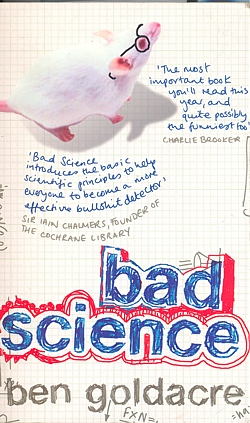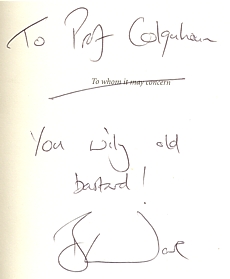Goldacre Bad Science badscience review homeopathy CAM v
There have been some really excellent books about quackery this year. This isn’t one of them, because
 |

Nice dedication uh? |
it is about a lot more than quackery It is about the scientific method in general. and in particular about how often it is misunderstood by journalists. Abuse of evidence by the pharmaceutical industry is treated just as harshly as abuse of evidence by homeopaths and you get the low-down on both.
“More importantly, you will also see how a health myth can be created, fostered and maintained by the alternative medicine industry using all the same tricks on you, the public, which big pharma uses on doctors. This is about something much bigger than homeopathy.” (p.28)
Sir Iain Chalmers, a founder of the Cochrane Collaboration , co-author of the best lay text on evidence says: “Bad Science introduces the basic scientific principles to help everyone become a more effective bullshit detector”. And there is no more invaluable skill than being a bullshit detector.
Chalmers says also “Ben Goldacre has succeeded where the ‘public engagement in science’ organisations have so signally failed.” That is exactly right. ‘Public engagement’ has rapidly become bureaucratised, and at its worst, is no better than a branch of the university’s marketing department. This sort of public engagement corrupts as much as it enlightens. Goldacre enlightens, and he also makes you laugh.
In the introduction, Goldacre says
“You cannot reason people out of positions that they didn’t reason themselves into.” (p xii)
It’s a nice point, but the rest of the book makes a magnificent attempt to do just that.
There is quite a lot about medicine, of course, that’s his job, after all. But it isn’t all quackery by a long chalk Quackery is merely a good hook to hang the arguments on about how you distinguish what’s true from what isn’t. That’s partly because quacks make every mistake known to mankind (sometimes through ignorance, sometimes just to boost sales), and partly just because it is a topic that interests people, and with which they are bombarded every day I feel exactly the same. If I were to talk about the statistics of single ion channels, nobody would read it (big mistake -it’s fascinating), but if one can use the case of honey versus cough medicine to explain the analysis of variance, there is a chance that someone might find it interesting.
As much as anything, Goldacre’s book is about C.P. Snow’s two cultures. The chapters on the distortion and trivialisation of science in the media are just terrific.
“My basic hypothesis is this: the people who run the media are humanities graduates with little understanding of science, who wear their ignorance as a badge of honour. Secretly, deep down, perhaps they resent the fact that they have denied themselves access to the most significant developments in the history of Western thought from the past two hundred years.” Chapter 11, p. 207
“.. . . here is the information I would like from a newspaper to help me make decisions about my health, when reporting on a risk: I want to know who you’re talking about (e.g. men in their fifties): I want to know what the baseline risk is (e.g. four men out of a hundred will have a heart attack over ten years); and I want to know what the increase in risk is , as a natural frequency [not as relative risk] (two extra men out of that hundred will have a heart attack over ten years). I also want to know exactly what’s causing that increase in risk -an occasional headache pill or a daily tub full of pain-relieving medication for arthritis. Then I will consider reading your newspapers again, instead of blogs which are written by people who understand research , and which link reliably back to the original academic paper, so that I can double check their précis when I wish. ” (p. 242)
I detect some ambiguity in references to things that aren’t true. Sometimes there is magnanimity. At other times he is a grade one kick-ass ninja. For example
I can very happily view posh cosmetics -and other forms of quackery -as a special, self-administered, voluntary tax on people who don’t understand science properly (p. 26)
Of course nobody wants to ban cosmetics, or even homeopathy. But a lot of bad consequences flow from being over-tolerant of lies if you take it too far (he doesn’t). The lying dilemma and the training dilemma are among them. Some unthinking doctors will refer troublesome patients to a reflexologist. That gets the worried-well out of their surgery but neglects the inevitable consequence that Human Resources box-ticking zombies will then insist on having courses that teach the big toe is connected to the kidney (or whatever) so that reflexologists can have an official qualification in mystical mumbo-jumbo.
Is there anything missing from the book? Well inevitably. There are plenty of villains among the peddlers of nutri-bollocks, and in the media. But there isn’t much about the people who seem to me to be in some ways even worse. What about the black-suited men and women in the Ministry of Health and in some vice-chancellors’ chairs who betray their institutions and betray the public through some unfathomable
mixture of political correctness, scientific ignorance and greed? What about the ludicrous behaviour of quangos like Skills for Health? You have to wait right to the end of the book to hear about universities. But when it comes, it is well worth the wait.
“I’m not surprised that there are people with odd ideas about medicine, or that they sell those ideas. But I am spectacularly, supremely, incandescently unimpressed when a a university starts to offer BSc science courses in them.” (p. 317)
It’s almost worth buying Ben Goldacre’s book for that sentence alone.
This book is a romp through the folly, greed and above all the ignorance of much in our society. It’s deeply educational. And it makes you laugh. What more could you want?
